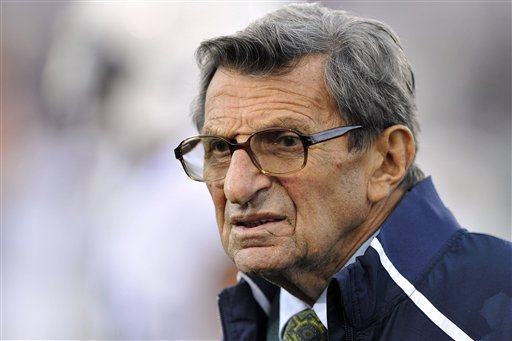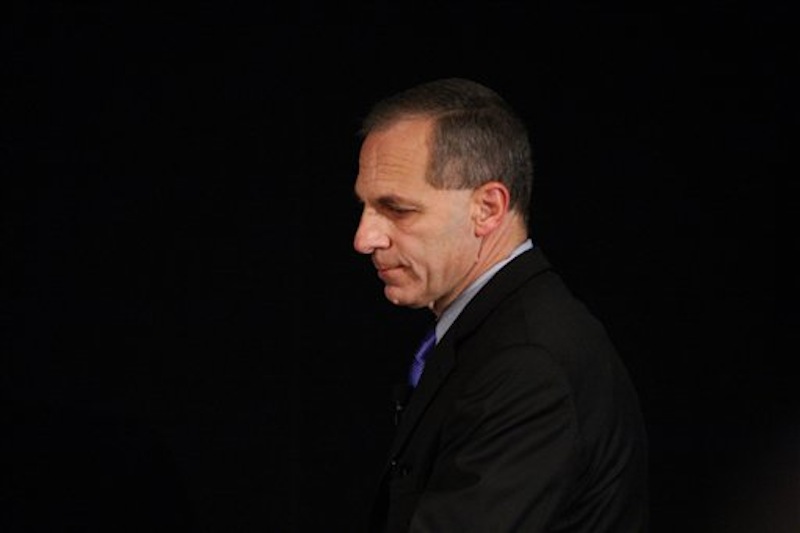Joe Paterno’s family on Monday vowed its own investigation of the Jerry Sandusky child sex abuse scandal, rejecting the findings of a special investigator who concluded the late football coach and other top Penn State administrators concealed Sandusky’s abuse to shield the university from bad publicity.
“Our interest has been and remains the uncovering of the truth,” the family said in a statement.
The family characterized the 267-page report by former FBI Director Louis Freeh, who was hired by the university’s board of trustees, as “yet another shocking turn of events in this crisis” and said Paterno, who died in January at age 85, did not knowingly protect a pedophile.
“We are dismayed by, and vehemently disagree with, some of the conclusions and assertions and the process by which they were developed,” the statement said. “Mr. Freeh presented his opinions and interpretations as if they were absolute facts.”
Sandusky awaits sentencing after being convicted last month of abusing 10 boys. He has maintained his innocence.
Freeh, citing emails and handwritten notes, concluded that Paterno intervened to stop a plan by three top Penn State officials to report a 2001 allegation against Sandusky to child-welfare authorities. The report also cited two emails that showed Paterno knew about a 1998 allegation against his longtime defensive coordinator.
Freeh said Paterno and the other three officials, including ousted Penn State President Graham Spanier, exhibited “callous and shocking” disregard for child victims.
Spanier’s attorneys criticized the Freeh report on Monday, saying it contained numerous inaccuracies and reached conclusions unsupported by the data.
“Mr. Freeh unfairly offered up Dr. Spanier and others to those insisting upon a finding of culpability at the highest level of the university,” attorneys Elizabeth Ainslie and Peter Vaira said in a statement.
A spokesman for Freeh did not immediately respond to a request for comment.
The Paterno family, in its statement, said the coach reported the 2001 allegation from graduate assistant Mike McQueary, who told Paterno he saw Sandusky sexually assaulting a boy in the football team showers, to his superiors.
“It can certainly be asserted that Joe Paterno could have done more. He acknowledged this himself last fall,” the statement said. “But to claim that he knowingly, intentionally protected a pedophile is false.”
The family has aggressively sought to defend the Hall of Fame coach in the face of a scandal that cost him his job and seriously diminished his legacy.
Public relations expert Jonathan Bernstein, president of Bernstein Crisis Management Inc. and the author of texts on crisis communications, said he would have advised the Paterno family to issue a “short message of compassion” for Sandusky’s victims and then conduct its own investigation quietly if it disagreed with the conclusions of the Freeh report.
Announcing the probe now could wind up backfiring on the family, he said, because there will be pressure to release the findings publicly and “the results of the investigation could end up corroborating what was said in the Freeh report.”
Monday’s statement was issued amid calls for the removal of the famed statue of Paterno outside Beaver Stadium. A university spokesman said Sunday there’s been no decision on the sculpture’s fate.
Penn State President Rodney Erickson on Monday vowed cooperation with further investigations but also said decisions about the future “will take time.”
Erickson wrote in a message to students, faculty and staff on Monday that the eight months since Sandusky was charged have been “heart-wrenching and difficult” and said his heart was heavy for the victims.
“We can never again allow this to happen,” he said, adding that the university was committed to ensuring the safety of children on campus and increasing awareness of child sex abuse and mistreatment.
Meanwhile, Penn State spokesman David La Torre confirmed that certain elements of the retirement package given to Sandusky had been revoked by the university, though he did not say if that was after Sandusky’s arrest in November or after his conviction last month.
Sandusky, who will likely spend the rest of his life in prison, lost four free season tickets for football; a pair of men’s and women’s basketball tickets for life; access to locker, fitness training and weight rooms; and an on-campus office.
But La Torre said Penn State would not seek repayment of a $168,000 lump sum also included in the retirement package.
Send questions/comments to the editors.



